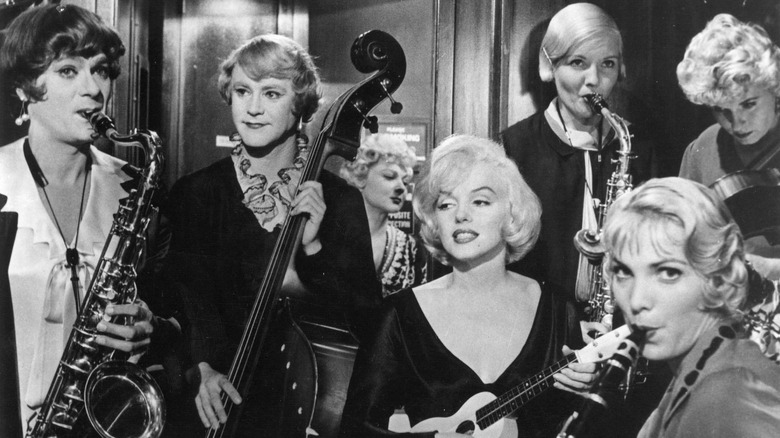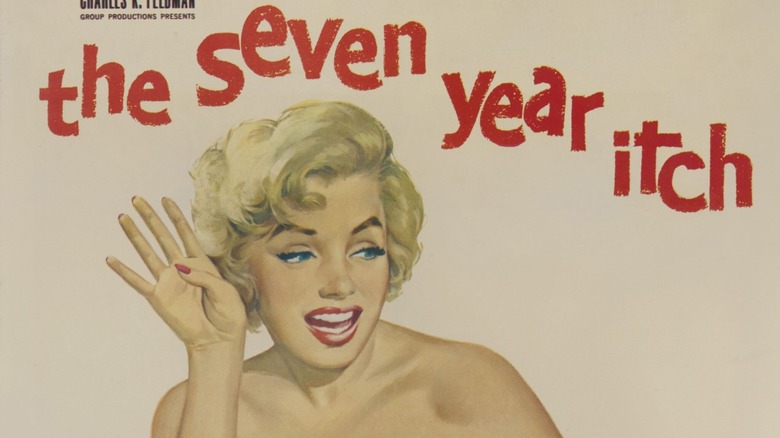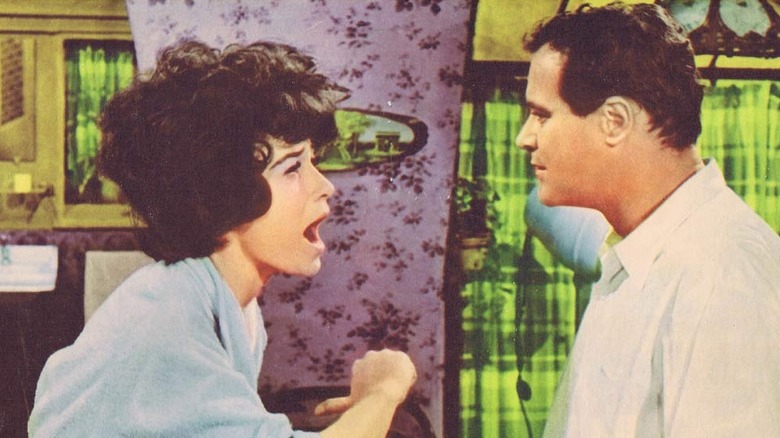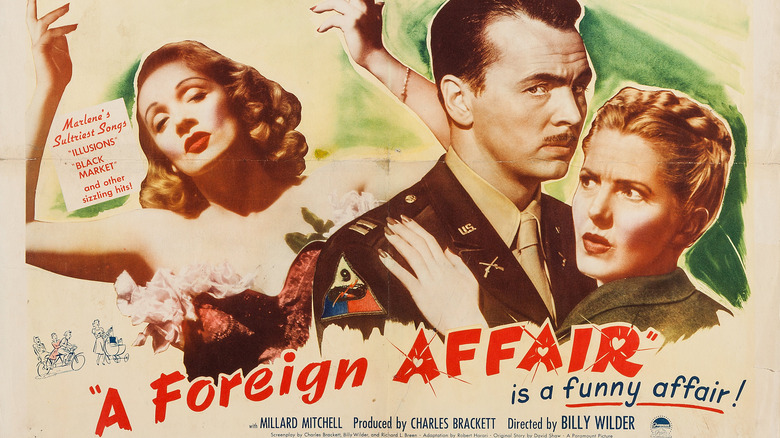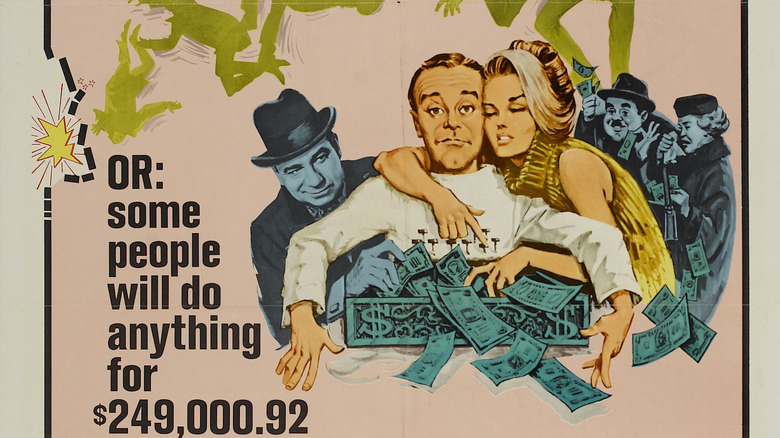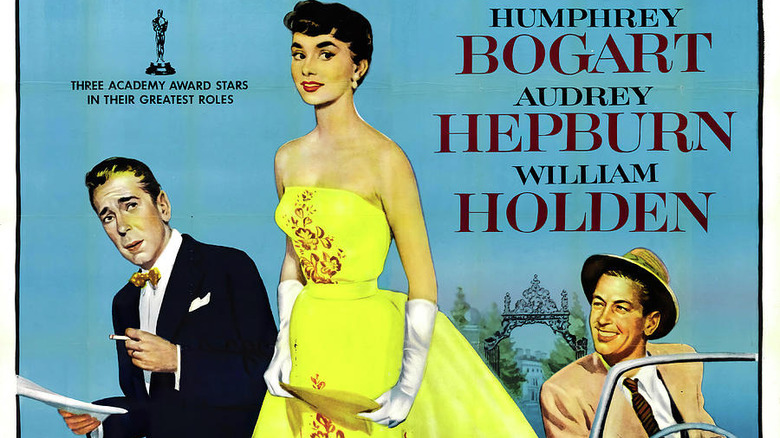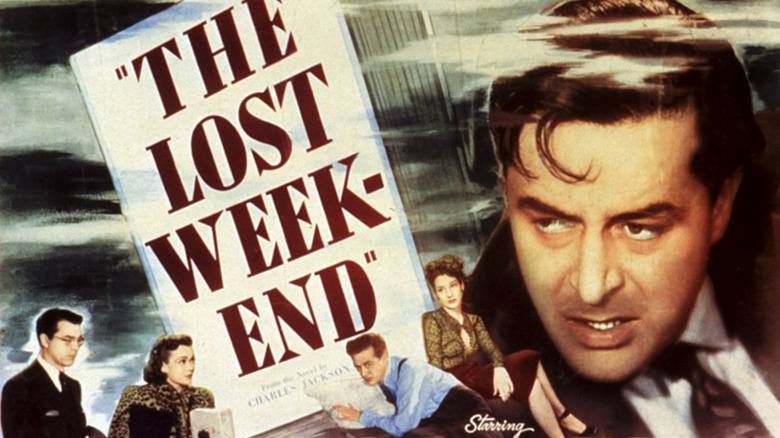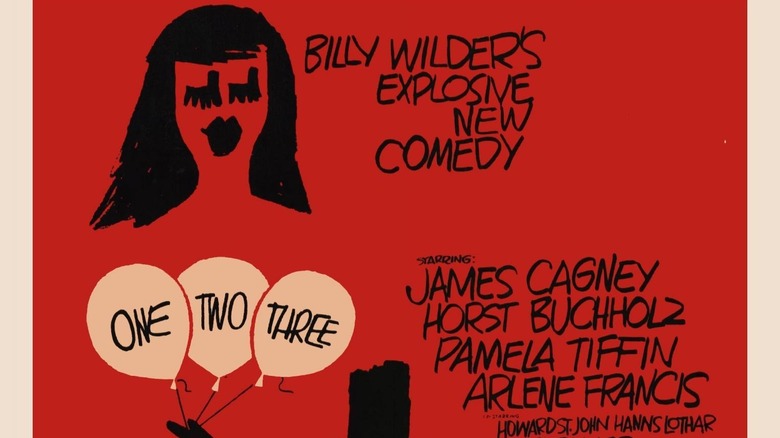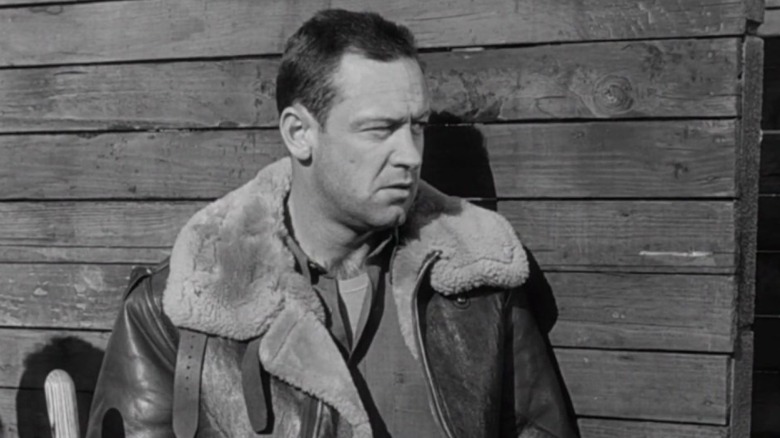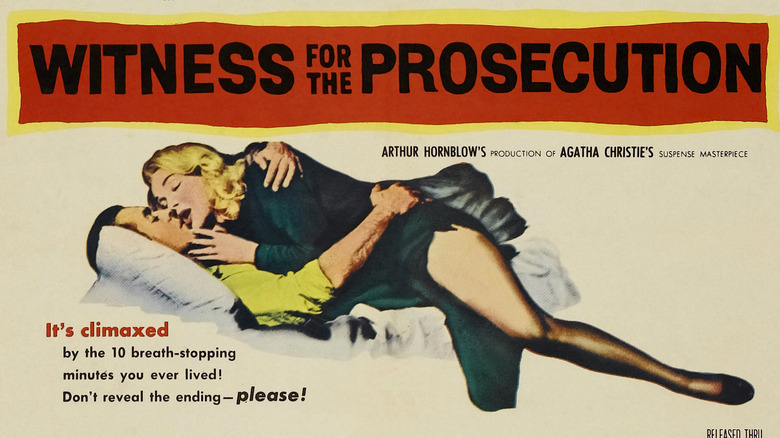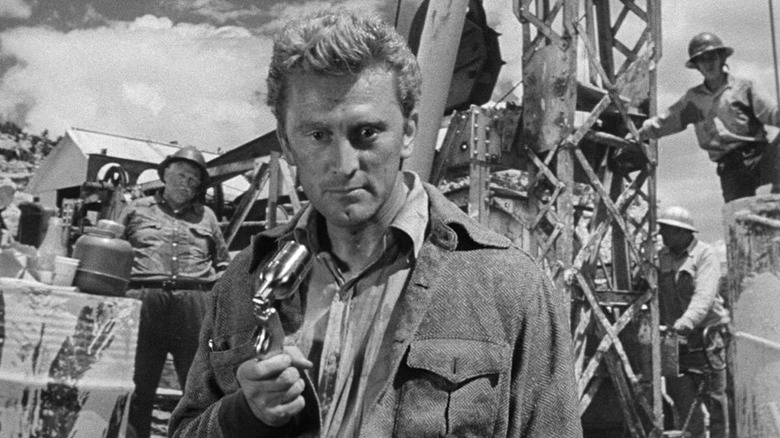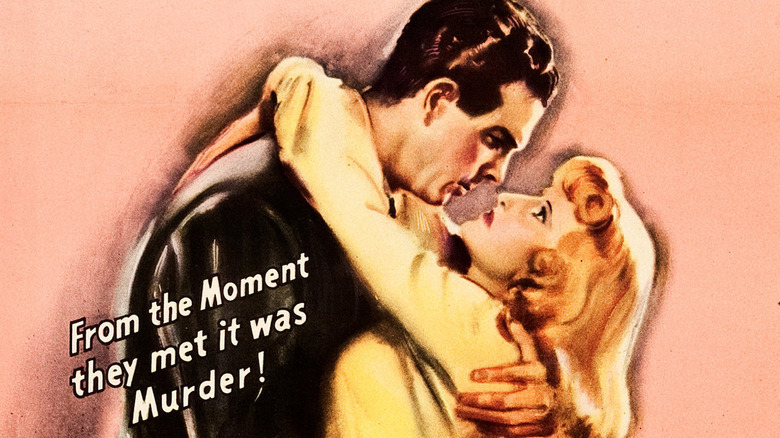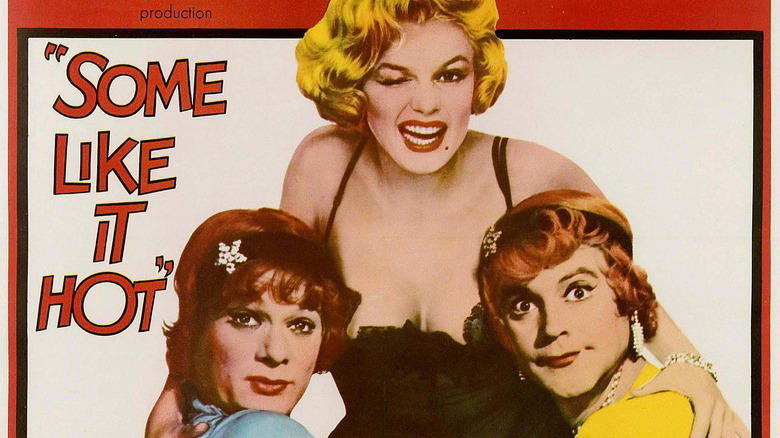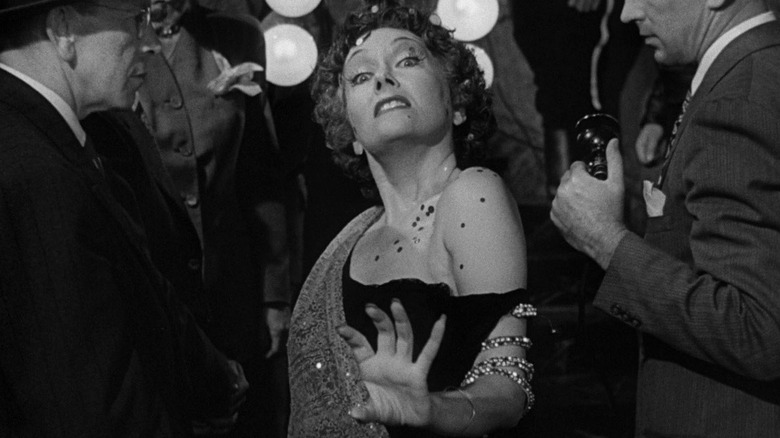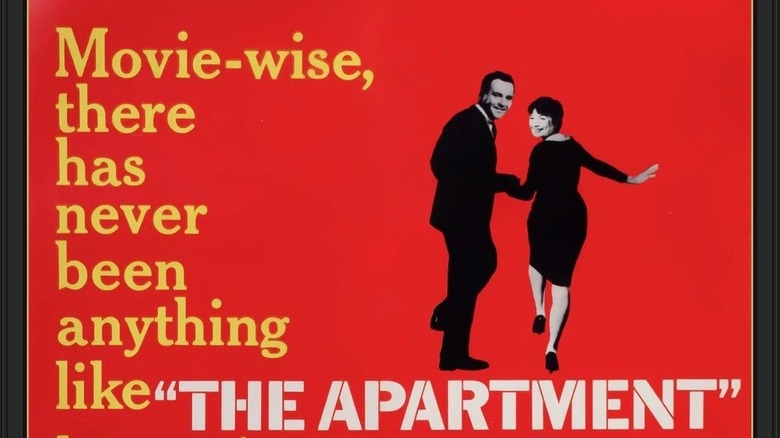The 14 Best Billy Wilder Movies, Ranked
Any film nerd who knows their stuff will tell you that few have contributed as much to cinema as Billy Wilder. His films are typified by their sharp dialogue, clearly defined characters, and tightly-written plots. When you've seen a few Wilder flicks, it becomes nearly impossible not to notice his unique style that's influenced countless filmmakers. Another of Wilder's directorial traits is his tendency to dip into often-taboo subjects — like Nazis, alcoholism, murder, and infidelity — especially in eras when filmmakers usually danced around them. His versatility as a storyteller of the moving image is unparalleled as he bounced back and forth between grim and gritty film noir and whimsical romantic comedy. Wilder knew how complicated his role as a director could be, once stating the five things a director must be.
So many of Billy Wilder's films were magnets for Academy Award nominations; the man has 21 nominations with six wins, and he's directed 14 different actors in Academy Award-nominated performances. His career was long and prolific, spanning 27 films as a director across almost 50 years. Considering how many spectacular films Wilder has in his cinematic corpus, it was a nearly impossible task for this writer to rank his 14 best movies, but dammit he tried his hardest.
14. The Seven Year Itch (1955)
Richard Sherman lives a pretty average life, with a good job in the publishing business, a loving wife and son, and a nice apartment in New York City. When his spouse and child head up to Maine for the summer, Richard decides to take advantage of the situation and live the bachelor's life for a while. However, a wrench is thrown into his plans when he meets The Girl, a stunning yet naive young woman who just moved into the apartment above him and is new to the city. The two strike up a friendship with Richard beginning to fall in love with her. He justifies his growing attraction to her when his overactive imagination causes him to think that his wife may be having an affair behind his back despite no real evidence of this. Will Richard stay true to his wife or will he cave and scratch that seven-year itch?
This film is most notable for producing that iconic image of Marilyn Monroe — who plays The Girl — standing on a subway grate with a breeze blowing up her skirt. There's plenty more to appreciate, though, such as Billy Wilder's tendency to push the bounds of acceptability of an era that frowned upon making light of adultery. It's not quite the classic as many of his other films, but Wilder still manages to produce a quaintly spicy comedy.
13. Irma la Douce (1963)
Nestor Patou is an honorable French police officer who's fired from his job after he's framed for bribery during a raid on a prostitute-filled hotel in the Red Light district. With nowhere else left to go, Nestor returns to the neighborhood that ended his career in law enforcement and rescues a prostitute named Irma la Douce from her violent pimp. They strike up an unusual bond and move in together, with Nestor inadvertently becoming her new pimp. However, because Nestor is falling for Irma and wants her to give up her life as a prostitute, he sets up an alternate identity as a wealthy man named Lord X who becomes her only customer. Surely this won't result in an abundance of confusion and hijinks, right?
Jack Lemmon and Shirley MacLaine had such terrific chemistry together in Billy Wilder's previous film, "The Apartment," that it's a blast to see them together again in another comedy, even if it doesn't quite reach the hilarious heights of that one. As the times began to loosen up on what you could get away with in movies, Wilder kept pushing the envelope with even more double entendres and sly sexual humor, yet still manages to deliver a class affair.
12. A Foreign Affair (1948)
Not long after the end of WWII, Phoebe Frost and the other members of a U.S. congressional committee arrive in Berlin to determine the source of the low morale permeating the troops stationed there. Phoebe stumbles upon hearsay about cabaret singer Erika von Schlütow being the former mistress of high-ranking Nazi officials and that an American soldier is hiding her. To weed her out, Phoebe hires Captain John Pringle to investigate, but little does she know that John is actually the one protecting her from the Americans. John decides to distract Phoebe by flirting with her, which she initially rebuffs only to begin falling for him.
Leave it to Billy Wilder to set a romantic comedy in war-torn Germany and pull it off. While "A Foreign Affair" doesn't pack quite the humorous punch of his later comedies like "The Apartment" and "Some Like It Hot," it still has a fair bit of biting wit that would become part of his signature style, and he does a commendable job of balancing the whimsical and the serious without too many tonal shifts.
11. The Fortune Cookie (1966)
Harry Hinkle is a cameraman for CBS who gets injured while filming a football game. When Harry's scheming, ambulance-chasing brother-in-law William H. "Whiplash Willie" Gingrich hears of what happened to him, he convinces him to exaggerate his slight injuries so that he can claim a million dollars from his insurance company. Harry's largely against the idea until his ex-wife Sandy comes to visit him, believing he can win her back by pretending he's suffering more than he actually is. However, Luther "Boom Boom" Jackson, the Cleveland Browns football player who injured Harry, feels so terrible for what he did to him that his skills begin to decline, getting him in trouble with the rest of the team.
In true Billy Wilder fashion, a silly concept gets pushed to extremes with few characters being spared from its wackiness. This is the first time that Jack Lemmon and Walter Matthau shared the screen together, going on to collaborate 10 more times after this (if you include Jack Lemmon directing Matthau in "Kotch"), and they make a delightful duo. While this later-period film doesn't quite match the heights of his previous work, "The Fortune Cookie" still proved that Wilder knew how to deliver a rollicking picture.
10. Sabrina (1954)
As members of the wealthy Larrabee family, brothers David and Linus couldn't be more different: David is a playboy who spends his time carousing with attractive women, while Linus focuses on the family business. The daughter of their chauffeur, Sabrina Fairchild, has a crush on David but he barely acknowledges her existence. However, when she returns from a two-year stay in Paris as a classy and attractive young woman, David starts to fall for her much to her delight. A love triangle emerges when Linus begins to develop feelings for Sabrina, who she is also starting to fall for as well.
The stellar cast of Audrey Hepburn, Humphrey Bogart, and William Holden lead this charming romantic comedy, whose commentary on love and relationships holds up remarkably well even today. As usual in a Billy Wilder film, the contrasting characters play off one another perfectly with sharp witty dialogue abounding while never losing sight of just how complicated love can be.
9. The Lost Weekend (1945)
Don Birnam is a talented novelist living in New York City. He's also an alcoholic whose drinking addiction is hurting his output. His girlfriend Helen and brother Wick know about his condition, but they believe that he's got it under control. Even so, they make plans with him to distract him from his urge to drink, such as when Don arranges a trip to the country for the two of them that weekend. Don would rather stay in the city and drink so he bails out on his brother at the last second so that he can spend the weekend getting drunk. Broke, Don starts resorting to more drastic means to get money to buy alcohol. Luckily, Helen cares deeply about him and is determined to shake him off his addiction.
One of Billy Wilder's greatest traits as a filmmaker is his ability to fearlessly dive into dark subjects without coming off as shocking for its own sake. In "The Lost Weekend," Wilder forces us to confront the dangers of alcoholism — a topic that was rarely portrayed in the 1940s — and manages to treat it with grace and care. Wilder won his first two Oscars here – for best director and best screenplay – and rightfully so.
8. One, Two, Three (1961)
Legendary crime film actor James Cagney plays C.R. "Mac" MacNamara, the head of operations for Coca-Cola in West Berlin. It's not a bad job, but Mac is working towards becoming the head of Western European Coca-Cola Operations, so when his boss W.P. Hazeltine charges him with the task of taking care of his 17-year-old daughter Scarlett, Mac accepts. Scarlett spends most of her time partying in West Berlin, much to Mac's chagrin, and she soon announces her spontaneous marriage to Otto Piffl, a young Communist from East Berlin. Mac realizes that this will make him look bad to his boss, so he crafts a scheme to have Otto arrested. However, when Mac learns that his boss is coming to West Berlin to visit soon, he must find a way to get Otto out of jail and turn him into a presentable capitalist in front of his new father-in-law.
Billy Wilder is the undisputed king of taking silly situations and complicating the living hell out of them. While "One, Two, Three" doesn't quite match the comedic heights of Wilder's other screwball comedies like "The Apartment" or "Some Like It Hot," the film has countless hilarious twists and turns and moves along at such a fast pace that it's easy to forgive its few shortcomings. Also kudos to Wilder for tackling a controversial political subject so fearlessly.
7. Stalag 17 (1953)
A group of American sergeants are imprisoned in a German prisoner-of-war camp called Stalag 17 during WWII. They devise a plan to allow two of their own — Johnson and Manfredi — to escape from the camp, but they fall into a trap and are immediately killed by Nazi guards. The remaining prisoners begin to suspect that someone among them has leaked this crucial plan to the Nazi guards, believing it's J.J. Sefton, an American prisoner who often conducts deals with the captors to make his caged life more comfortable. J.J. claims that he's not in cahoots with the Nazis, but that doesn't do much to quell the paranoia surrounding him, which means it's on him to find out who the real informant is.
It's hard to make a topic like Nazi POW camps funny. Classic TV show "Hogan's Heroes" is often seen as trailblazing for doing just that, but Billy Wilder had beaten them to punch by more than a decade. Here he directs William Holden in an Oscar-winning performance, and Holden is perfect as the delightfully cynical J.J. Sefton. As usual, Wilder's signature dark sense of humor is on full display as he manages to wring considerable laughs out of a dark subject.
6. Witness for the Prosecution (1957)
Leonard Vole has been charged with the murder of Mrs. Emily French, an affluent old woman who was so attached to Leonard that she included him in her will as the primary beneficiary. Senior barrister Sir Wilfrid Robarts decides to take on the case, believing that there's more to Leonard's situation even when the evidence is against him. While Sir Wilfrid is quite right in his assertion that the case is more complicated than it seems, he still isn't prepared for the many surprises that await him as he builds his defense of Leonard, whose German wife Christine plays into it.
Billy Wilder directed and adapted "Witness for the Prosecution" from a play by legendary mystery novelist Agatha Christie, turning it into a terrific film that's packed with masterful twists and turns. While it mostly falls into the courtroom drama genre, its unpredictability makes this a first-rate thriller while its moral ambiguity qualifies as top-notch film noir as well. So great was the final reveal of "Witness for the Prosecution" that the end credits feature a voiceover stating: "The management of this theater suggests that, for the greater entertainment of your friends who have not yet seen the picture, you will not divulge to anyone the secret of the ending of 'Witness for the Prosecution.'"
5. Ace in the Hole (1951)
Kirk Douglas stars in "Ace in the Hole" as Chuck Tatum, a once-successful New York City journalist who's now a washed-up alcoholic. Down on his luck, he ends up in New Mexico and manages to get a job covering local stories for the small Albuquerque Sun-Bulletin. Chuck's not happy reporting on trivial happenings in the area, but when he discovers the story of Leo Minosa — stuck in a cave collapse while looking for ancient Indian relics — Chuck immediately sees this as an opportunity to reestablish himself as a top journalist. Since Chuck is only in this to boost his reputation, he hinders efforts to get Leo out safely in order to keep him in the news and milk the publicity as much as he can. Of course, it's only a matter of time before Chuck's cynical schemes come to bite him.
Even though "Ace in the Hole" came out more than half a century ago, its biting critique of media manipulation still rings true. Through Billy Wilder's sharp direction and writing, the film not only points the finger at the journalism business but also at audiences who are more than eager to eat up the sensationalism they produce.
4. Double Indemnity (1944)
Fred MacMurray plays Walter Neff, a salesman for an insurance company who develops a relationship with the flirtatious Phyllis Dietrichson, played by Barbara Stanwyck. Phyllis is married to one of his clients, but that doesn't stop them from continuing their affair. As Phyllis' hold on Fred tightens, she introduces the idea of killing her husband so that she'll receive the money from his life insurance policy. Fred is at first put off by the idea, but eventually agrees to the plan and even reminds her that she'll receive twice the amount because of a double indemnity clause in her husband's policy. The two lovers pull off the plan and seemingly get away with it, but Fred's colleague at the insurance company believes that there's more to the story than meets the eye.
Billy Wilder was amazing at crafting laugh-out-loud comedies, but he was just as talented when it came to making dark and gritty films. The film noir genre has been slowly solidifying for some time before "Double Indemnity" was released, but this film truly crystallized the style. From the bleak tone to the shadowy lighting to morally corrupt leads to the dark subject matter, "Double Indemnity" brought together so many elements that permeated the crime flicks of the time into a true film noir masterpiece.
3. Some Like It Hot (1959)
"Some Like It Hot" follows the story of two musicians who accidentally stumble into the infamous St. Valentine's Day Massacre in Chicago, and decide to skip town before mob boss Spats Colombo — who was behind the massacre — finds them. Since they're musicians they try to find musical groups to join, but the only one they can find is an all-female big band that's taking the train to Florida, prompting the two musicians to don women's clothes and hop aboard as members of the group. However, things get hot when one of the musicians starts to fall for the band's singer Sugar Kane Kowalczyk and tries to win her heart by disguising himself as a millionaire while also maintaining his identity as a female band member. Meanwhile, the other musician is getting hit on by an actual millionaire in his female disguise.
One of Billy Wilder's great contributions to cinema was pushing the bounds of acceptability in his films, and "Some Like It Hot" is a great example of his sly risqué sensibilities. The wacky plot ups its silliness to almost absurd heights but is always grounded by a stellar cast, clever dialogue, and a genuinely touching romance.
2. Sunset Blvd. (1950)
Joe Gillis is a once-successful screenwriter who is struggling to sell his latest script, racked up considerable debt, lost most of his friends in the film industry, and is considering getting out of the entertainment business to get a regular desk job. When he stumbles upon an old mansion where the former silent-movie star Norma Desmond has been living a reclusive life with no one else but her loyal butler, she strikes up an unusual friendship with him. She lets him live at her home in exchange for him writing a screenplay for what she believes will be her grand return to the big screen. However, Norma's attachment to Joe turns to obsession, which only worsens when he begins to fall for a young up-and-coming screenwriter.
In a time when movies about the film industry focused on its glitz and glamor, Billy Wilder had the guts to make a film about Hollywood's tendency to ruin even its biggest stars. "Sunset Blvd." goes to some unusually dark places, especially for the time, but thanks to Wilder's assured direction it never feels exploitative or melodramatic, always balancing the darkness with a biting wit and just the right amount of levity.
1. The Apartment (1960)
In "The Apartment," Jack Lemon plays C.C. Baxter, a milksop who works a boring desk job at a New York City insurance company. He's trying to get ahead at his company, and to do so he lets four executives borrow his apartment as a love nest for trysts with their extramarital lady friends in exchange for a good word on his behalf to the personnel director Mr. Sheldrake. C.C.'s neighbors think that he's quite the ladies' man bringing home a different woman to his apartment several nights a week. While C.C. is trying to keep his bosses happy, he falls for Fran Kubelik (played by Shirley MacLaine), but things get complicated when he discovers that she's having an affair with the married Mr. Sheldrake.
Not only is this the greatest collaboration between Billy Wilder and Jack Lemon, but also arguably the best film in Wilder's immense body of work. This best picture winner being the high point of his career, he never reached the same creative heights after this, although he came close. Wilder is in top form here, bringing his signature combination of wistfulness and sardonic wit to the fore in his exploration of the messiness of the human condition.
